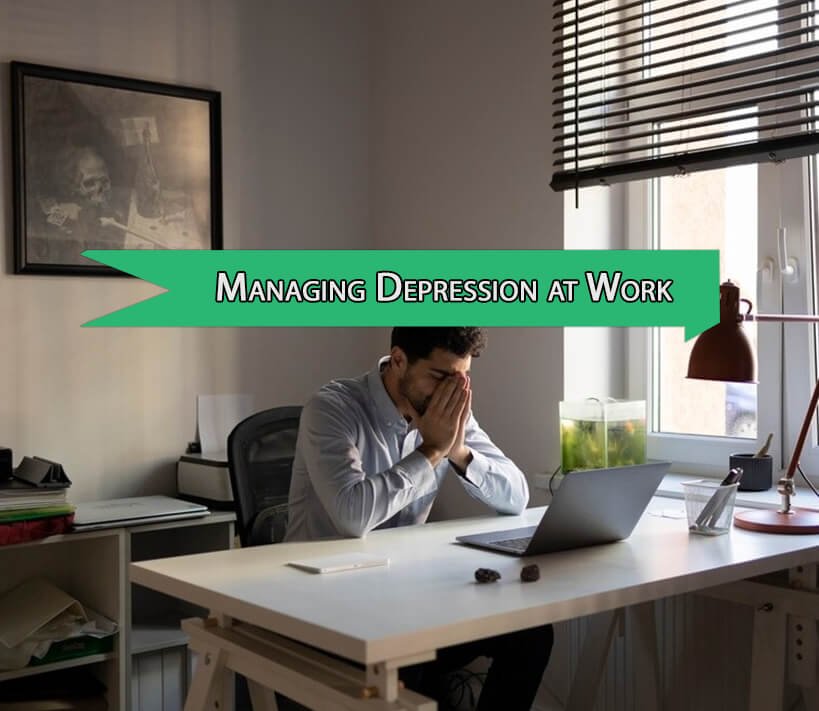Depression is a heavy burden, and trying to manage it while maintaining productivity at work can feel impossible. You may feel detached, drained, or overwhelmed by even minor tasks. But despite the difficulties, it is possible to cope with managing depression at work.
In this blog, we will explore some practical strategies to help you manage your depression while ensuring that your professional life continues to move forward.
Depression does not take a break just because you have a busy work schedule. It can make going to work seem insurmountable. The demands of deadlines, meetings, and tasks can amplify feelings of hopelessness and exhaustion. However, managing depression in the workplace is possible with the right strategies and mindset. Here how you can navigate your depression while staying productive at work:
1. Acknowledge your Feelings
The first step in dealing with depression at work is recognizing that you are struggling. Ignoring or avoiding your emotions only makes them more overwhelming. Acknowledging your feelings without guilt is essential, and reminding yourself that it is okay not to feel okay is a crucial part of the process. It is necessary to understand that mental health issues are just as significant as physical health issues, and seeking help is not a sign of weakness. Reach out to someone you trust, whether it is a colleague, a manager, or a mental health professional. It is also okay to ask for adjustments in your workload or take a break when needed. You are not alone, and addressing your mental health with compassion and patience is the key to navigating through it.
2. Practice Self-Compassion
Instead of beating yourself up for not being productive enough or not doing better, practice self-compassion. Understand that depression is an illness, not a reflection of your worth or capabilities. Being kind to yourself reduces the emotional burden.
3. Set Realistic Goals
When a person is depressed, even simple tasks can feel difficult. They should break their daily goals into smaller, manageable tasks. They should prioritize the most important tasks and focus on accomplishing them with their efforts.
4. Take Breaks
Staying seated at your desk for long periods can worsen burnout and feelings of fatigue. To avoid this, you should take regular breaks, even if they are short. A few minutes of walking, stretching, deep breathing, or mindfulness can help relax your mind and body. Stepping away from your workplace momentarily can help you reset and regain focus and improve your overall productivity.
5. Reach out for Support
When a person is managing depression at work, they should talk to someone they trust or seek help, as it provides emotional relief. You do not have to go through your struggles alone. If you are comfortable, you should speak to your HR about your issues or seek help from family, friends, or mental health professionals. There should be no hesitation in doing so. It is important to remember that reaching out is a sign of strength, not weakness. Talking about your feelings can help you feel understood and supported, making it easier to cope with difficult emotions. Sometimes, having someone listen can lighten the burden and help you find solutions to manage your stress.
6. Use Mindfulness Techniques
Practicing mindfulness techniques, such as focusing on your breath or being present in the moment, can help ground you when feelings of depression overwhelm you. These simple and quick techniques can be done anywhere. They can reduce anxiety and bring you back to the present, allowing you to focus on the task.
7. Work in an Organized Environment
Managing depression at work can be challenging, especially when the environment feels overwhelming. When a person is depressed, working in a disorganized setting can increase their stress and anxiety. However, their stress and distraction tend to decrease if they work in an organized and clean space. A tidy workspace creates a sense of order and control, which helps calm the mind. It also positively affects your psychoaura by fostering a more peaceful and focused atmosphere.
8. Leverage Your Psychoaura
Many people with depression report a shift in their psychoaura, a subtle change in their internal energy that signals a mood shift. Paying attention to these signs helps us manage our internal energy. When you notice that a person mood shifts, you can take proactive steps to calm yourself, whether through a brief break, deep breathing, or a quick walk.
9. Seek Professionals Help
If your depression is significantly impacting your work performance, seeking professional help is crucial. A therapist or counselor can help you develop coping strategies and address the root causes of your depression. In some cases, medication may also be necessary to help manage symptoms.
10. Create a Supportive Work Environment
If possible, foster a positive and supportive work environment. Surround yourself with colleagues who understand and support you. Positive interactions with others can boost your mood and make the workday less isolating.
Conclusion
Dealing with depression at work is challenging, but it is important to remember that you are not alone. With the right tools, support, and mindset, you can continue to thrive professionally while managing your mental health. Prioritize your well-being and take things one day at a time.




